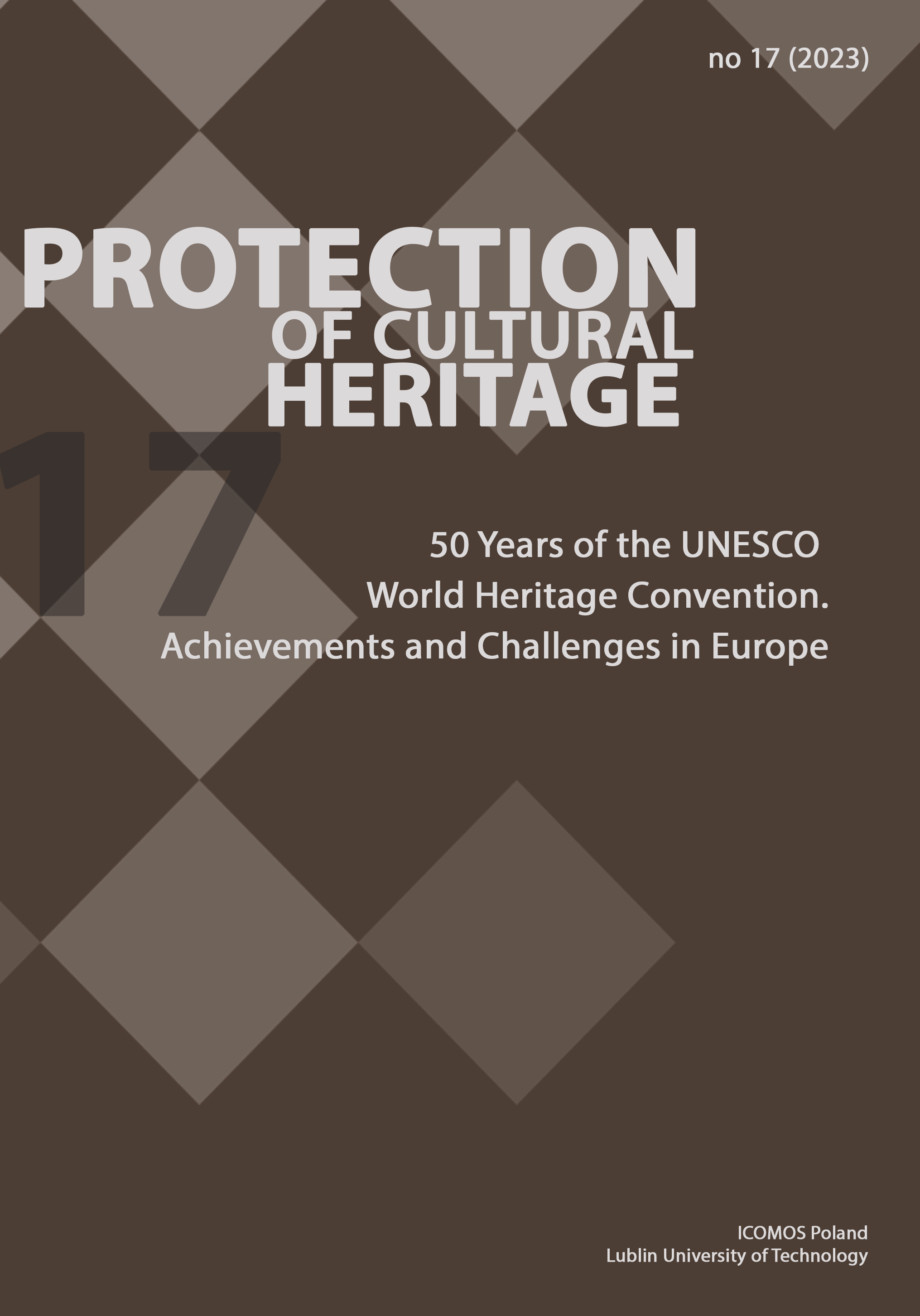Changing the game: the case of cultural landscapes
Article Sidebar
Issue No. 17 (2023)
-
35 years of World Heritage in the UK – challenges and opportunities
Chris Blandford1-16
-
34 years and counting: the so far experience of World Heritage assets in Thessaloniki, Greece
Dimitrios Zygomalas17-33
-
UNESCO World Heritage Convention – mission and commitment in times of challenges: lessons learnt from World Heritage Cities in Northwest-Europe and North-America
Matthias Ripp, Elena Arndt, Monika Göttler35-53
-
The 50 years of the World Heritage Convention in Spain: implementation, effects, and challenges
Mónica Luengo, Celia Martínez, Xavier Casanovas, Maider Maraña, Jordi Tresserras, Cristina Lafuente55-65
-
Introduction of the UNESCO World Heritage Convention at institutional level and on legal terms. The Hungarian example
Melinda Harlov-Csortán67-82
-
World Heritage at 50: policy and practice – key achievements and major challenges
Mechtild Rössler83-95
-
Changing the game: the case of cultural landscapes
David Jacques97-104
-
World Heritage as a balancing act: experiences from a medium-sized World Heritage City in Bavaria
Patricia Alberth105-114
-
Committee decisions impact on the World Heritage List: breaking the balance
Iva Zunjic115-128
-
Application of experience gleaned from the WHL system in national heritage protection systems – opportunities and benefits
Bogusław Szmygin129-136
Main Article Content
DOI
Authors
Abstract
There are a number of thoughtful analyses on how the World Heritage Convention has progressed, notably by Jukka Jokelhito, and by Christina Cameron and Mechtild Rössler. They explain the principles on which the World Heritage Convention was based. It concerns the common heritage of the world’s most significant places – we would all be poorer if we lost them.
This paper concerns the ideas we adopt in our dealings on landscape. The subject of cultural landscapes has been a latecomer in World Heritage terms. It is not a closely defined subject like, say, ecclesiastical architecture, and it has connections to many other subjects. Adjacent to many, it is defined by none. It still occupies a slightly detached column at the edge of the world heritage spreadsheet.
It is not this paper’s intention to claim that the cultural landscapes community has been the initiator of fundamental ideas, but it has been touched by many from within and outside the World Heritage system, and in some cases has been instrumental in bringing about fresh thinking and change.
Keywords:
References
ICOMOS. (1981). Florence Charter on Historic Gardens.
ICOMOS. (2017). Guide to the Culture Nature Journey’
International Scientific Committee on Cultural Landscapes. (2017). Principles Concerning Rural Landscapes as Heritage.
UNESCO World Heritage Committee. (2003). Convention on the Safeguarding of the Intangible Cultural Heritage.
UNESCO World Heritage Committee. (1994). Global Strategy for a Representative, Balanced and Credible World Heritage List.
UNESCO World Heritage Committee. (1972). Operational Guidelines for the Implementation of the World Heritage Convention.
Article Details
Abstract views: 232
License

This work is licensed under a Creative Commons Attribution-ShareAlike 4.0 International License.
David Jacques, International Scientific Committee on Cultural Landscapes
Dr. Jacques’s contribution to the history of landscape design has been profound. It has ranged over all periods since Tudor times, with seven books and thirty book chapters in British and foreign publications, and about 50 articles in British and foreign journals.
His best known books have been Georgian Gardens published in 1983 which demonstrated that there were many designers other than Capability Brown, and was on most garden history reading lists for 35 years.
Other notable titles include Gardens of Court and Country published in 2017 which provided for the first time a full account of the formal garden tradition in England 1630-1730. It was selected as an ‘Outstanding Academic Title’ by Choice, the publication of the American Libraries Association, and was shortlisted for the William MB Berger Prize for British Art History 2018.






